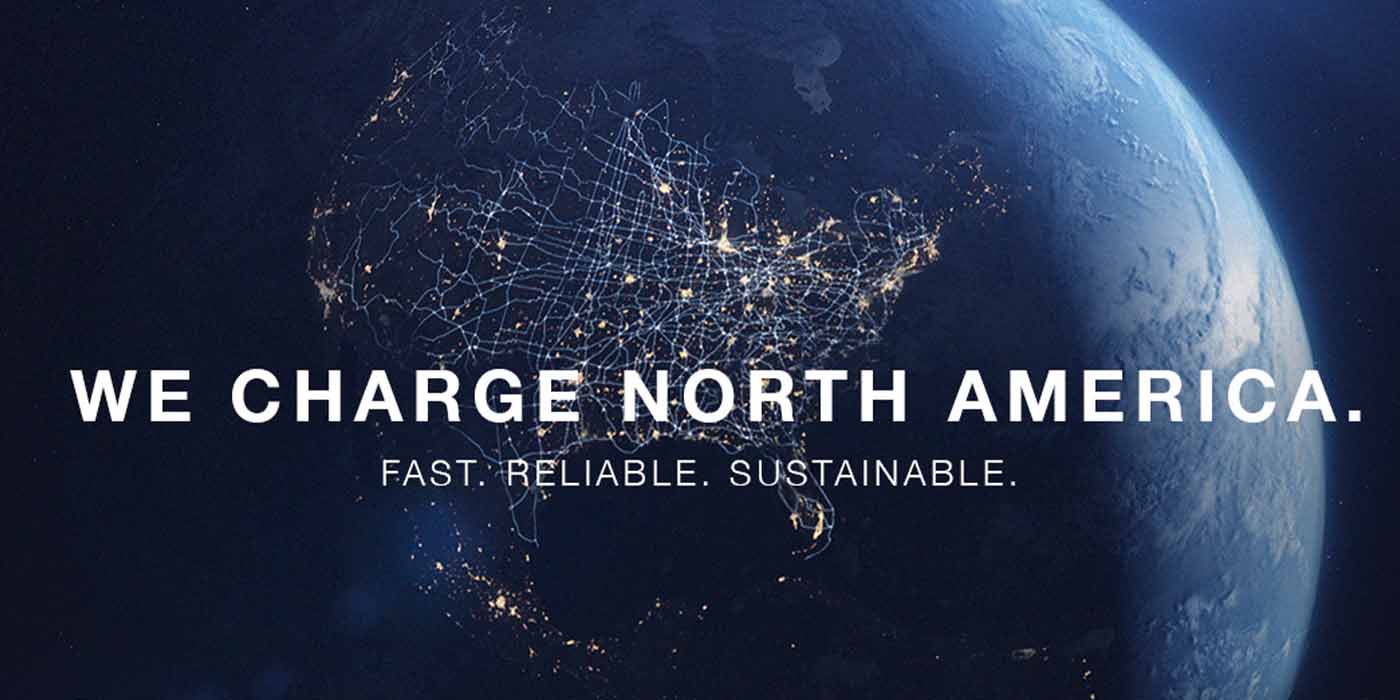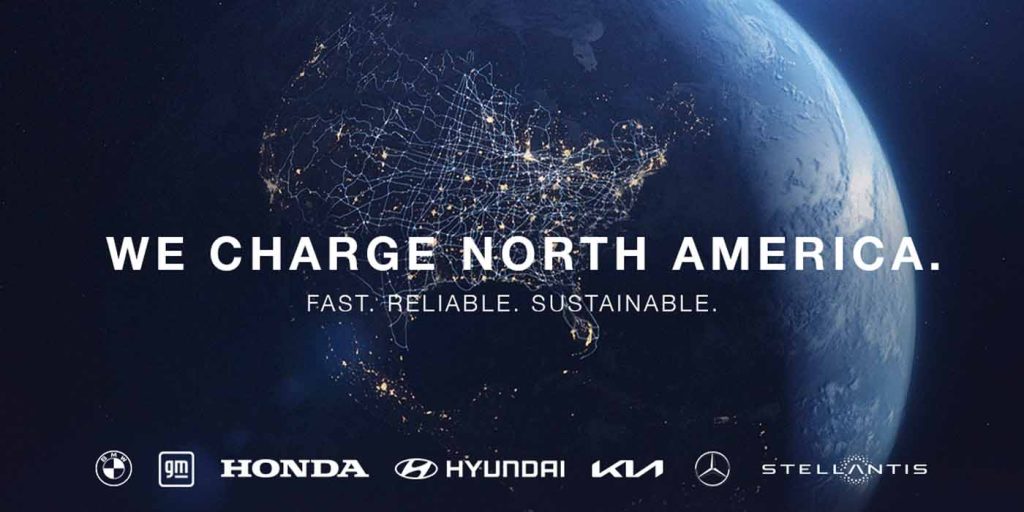
And yes, it’ll have NACS accessibility. In a shocking but exciting announcement this morning, a group of some of the world’s largest automakers has combined forces into a new joint venture to deliver a new “high-powered” charger network across cities and highways in North America to expedite EV adoption. Oh, and they intend to power the entire network with renewable energy.
This is big news.
In covering this beat, we’ve seen EV adoption and innovation, as a whole, absolutely snowball globally in recent years. In North America, the transition to EVs by legacy automakers and consumers alike has been expedited by advantageous legislation implemented by US and Canadian governments.
In the US, the Biden administration’s Build Back Better Plan and passed Inflation Reduction Act have established federal tax credits for new and used EV leases and purchases, while helping fund the National Electric Vehicle Infrastructure (NEVI) program to enable the installation of EV charging stations around the country.
The past two years especially, we’ve seen young and legacy EV automakers alike pairing up with existing charging networks that are slowly but surely expanding availability – permitting, grid access, and maintenance woes be damned.
Despite all that, Tesla’s Supercharger network has remained the undisputed champion in fast charger access and dependability, especially now that universal Magic Dock piles are rolling out, offering charging access to other branded EVs.
While our recent focus has been on nearly all major automakers and charging networks adopting Tesla’s North American Charging Standard (NACS), it appears to be a mere footnote in today’s story that could see the number of publicly available DC fast chargers nearly double in a short time.
So who’s behind this massive joint venture to deliver a clean-powered charger network? You’ll recognize every single name.

JV network to double EV fast charger access in the US
BMW Group, GM, Honda, Hyundai, Kia, Mercedes-Benz Group, Stellantis NV – what an unprecedented roster of automotive prowess teaming up for a yet-to-be-named charging joint venture.
The seven new partners state that the joint venture intends to leverage federal and state investments in public charging with its own public and private funding, to quickly develop and implement a new network of “high-powered” chargers across North America. Each pending site will be equipped with multiple DC fast chargers that will be accessible to any and all EV drivers, whether their vehicle is using CCS or NACS. Well, maybe not all EVs… no mention of CHAdeMO (sorry LEAF drivers).
Per the US Department of Energy, there are 32,000 publicly available DC fast chargers in the United States as of July 2023, but 2.3 million EVs are vying for a plug. That’s a ratio of 72 vehicles per charger. The National Renewable Energy Laboratory (NREL) estimates that 182,000 DC fast chargers will be needed in the US alone to support the 30-42 million BEVs and PHEVs estimated on roads by 2030.
Beginning later this year, the new joint venture intends to add at least 30,000 new chargers to the tally sheet and is already vowing to deliver an experience that is “seamless, vehicle integrated, and supported by the quality, reliability, and resources of world-leading automakers.”
The network will also be powered by 100% renewable energy and offers Plug & Charge capabilities for those vehicles that support it. The CEO of each of the seven new charging partners had something to say, but Mercedes Group chief Ola Källenius’s words resonated most:
The fight against climate change is the greatest challenge of our time. What we need now is speed – across political, social and corporate boundaries. To accelerate the shift to electric vehicles, we’re in favor of anything that makes life easier for our customers. Charging is an inseparable part of the EV-experience, and this network will be another step to make it as convenient as possible.
The initial plans for the network will see fast chargers installed in metropolitan areas and along major highways in North America, including connecting corridors and “vacation routes.” (You’d better start saving for Disney World.) These all won’t simply be charging piles in some random parking lot either – the new partners are genuinely looking to deliver a best-in-class EV charging experience and have said so outright. Per this morning’s release:
Focused on customer comfort and charging ease, the stations will be in convenient locations offering canopies wherever possible and amenities such as restrooms, food service and retail operations either nearby or within the same complex. A select number of flagship stations will be equipped with additional amenities, delivering a premier experience designed to showcase the future of charging.
The joint venture says work on the new fast charger network will begin later this year with first stations expected to open in the US next summer. Canada’s first stations will come “at a later stage.” Sorry!
Electrek’s Take
This is honestly shocking news.
I couldn’t believe it when I saw it on the page…
Honda?!?
Kidding. All are welcome in news like today’s joint venture, and Honda has found some truly strong company as it works to play catchup in a market landscape that is expected to see at least 50% of vehicle sales in the US be electric by the end of the decade.
This alliance may seem like its gunning for the Tesla Supercharger network and maybe it is, but who cares? We as EV drivers all benefit and so does the prospect of steadfast EV adoption. Tesla also doesn’t have anything to worry about as its network is only getting larger, plus everyone has essentially adopted its standard anyway so I think it’ll be just fine.
The real focus here should be the 30,000 new chargers on the way. Additionally, they’ll be powered entirely by renewable energy? *Chef’s kiss*
30K new piles are not enough to keep up with adoption yet, but one giant leap forward with plenty of automotive clout in the JV to instill confidence. Let’s just hope they don’t name the charger network something stupid like “X.”
FTC: We use income earning auto affiliate links. More.
